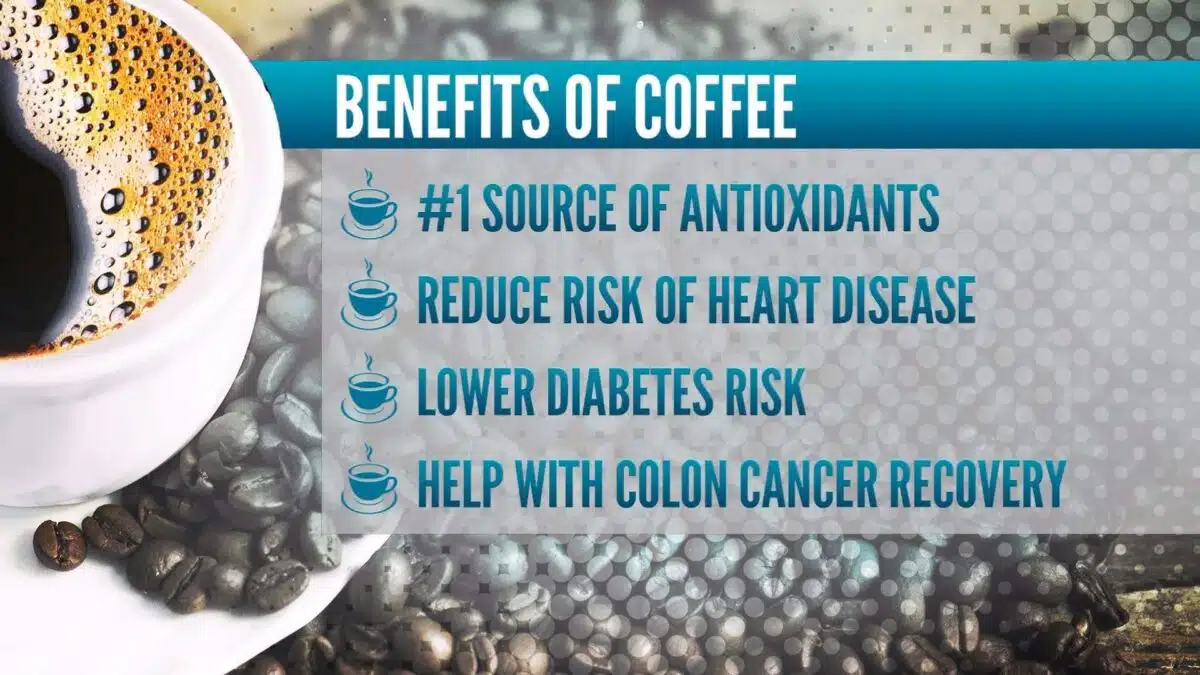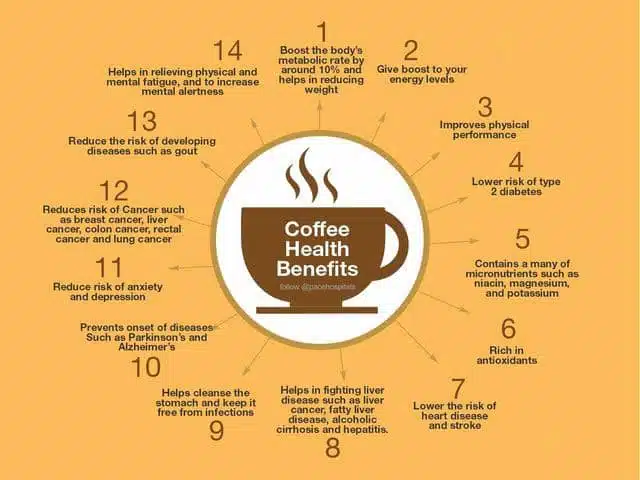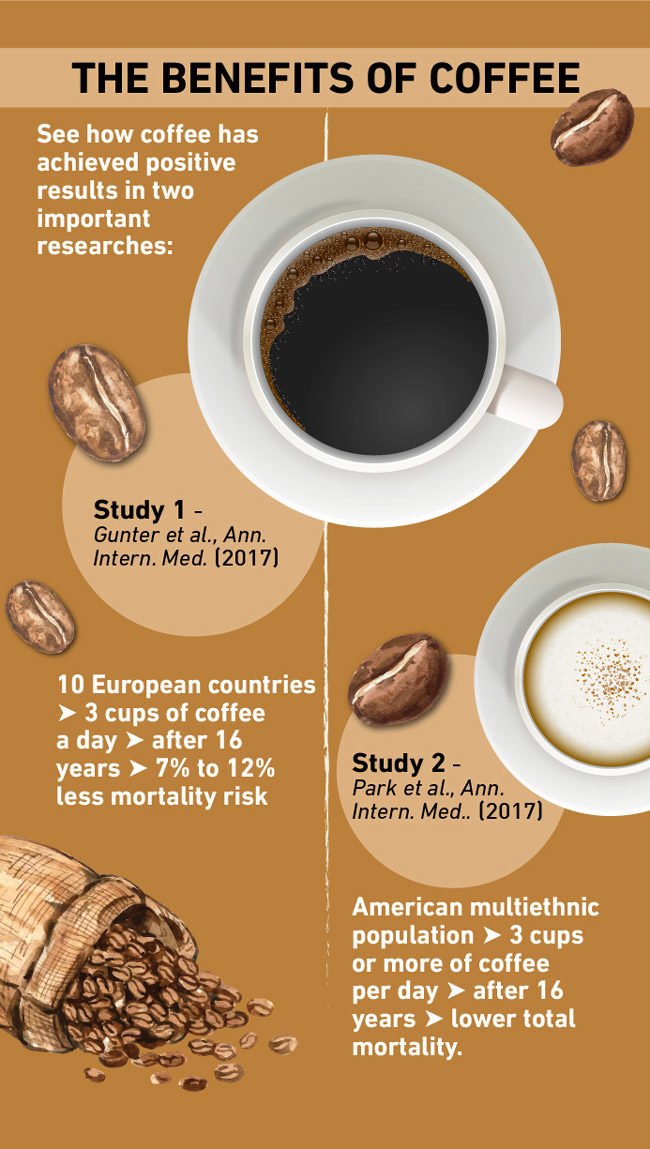Coffee lovers rejoice! The benefits of coffee extend beyond its delightful aroma and rich flavor. This beloved beverage not only kick-starts your morning but also plays a significant role in boosting mental alertness and enhancing physical performance. Packed with antioxidants, coffee supports heart health and offers liver protection while reducing the risk of specific diseases. Additionally, it elevates your mood and well-being, making it a fantastic addition to a balanced lifestyle. Embracing coffee can truly make a positive impact on your overall health.
Introduction to the Benefits of Coffee
Coffee has long captured the hearts and palates of millions around the world, and it comes as no surprise that the benefits of coffee go beyond its delightful aroma and flavor. Scientific research highlights numerous positive effects on the human body, making coffee more than a mere morning ritual. Let’s dive into some of the most compelling reasons to enjoy this beloved beverage.
- Mental Stimulation: Rich in caffeine, coffee acts as a natural stimulant that can enhance cognitive function and improve alertness. It helps shake off that groggy morning feeling efficiently.
- Physical Boost: Many athletes swear by a cup of coffee to amplify their performance. Caffeine effectively increases energy levels, allowing individuals to push their limits during workouts.
- Antioxidant Properties: Coffee is packed with antioxidants, which help combat oxidative stress in the body. These compounds play a crucial role in fighting free radicals, contributing to overall health.
- Heart and Liver Health: Research suggests that regular coffee consumption may support cardiovascular health and promote liver function, possibly reducing the risk of liver disease.
In summary, recognizing the benefits of coffee offers a fantastic reason to indulge in your favorite brew responsibly. Embracing coffee as part of a balanced diet can lead to a healthier and more vibrant lifestyle. So, why not enjoy that cup of joe with confidence today?

Boosting Mental Alertness
One of the most celebrated benefits of coffee is its powerful ability to enhance mental alertness. The caffeine present in coffee acts as a natural stimulant, affecting the central nervous system and providing an array of cognitive advantages.
Here’s how coffee promotes mental clarity:
- Increases Focus: Caffeine blocks adenosine, a neurotransmitter that promotes sleep, leading to increased attention and concentration.
- Improves Reaction Time: Studies show that coffee can enhance reaction times, making it an excellent choice for tasks requiring quick thinking.
- Enhances Learning & Memory: Regular coffee consumption can facilitate better retention of information, enhancing overall learning capabilities.
Comparison of Mental Alertness Metrics
| Metric | Without Coffee | With Coffee |
|---|---|---|
| Focus Level | Moderate | High |
| Reaction Time (seconds) | 250 ms | 200 ms |
| Memory Retention (days) | 5 days | 7 days |
In summary, the benefits of coffee extend significantly to mental alertness, making it not only a delightful beverage but also a potent ally in navigating daily mental challenges. So, the next time you sip your cup, remember that you’re not just enjoying a flavorful drink but also fueling your brain’s performance!
Enhancing Physical Performance
One of the exciting benefits of coffee lies in its remarkable ability to enhance physical performance. Many athletes and fitness enthusiasts embrace coffee as a pre-workout beverage, thanks to several key factors:
- Increased Energy Levels: Caffeine, a primary component of coffee, stimulates the central nervous system, leading to heightened energy and alertness. This boost can help you tackle workouts with vigor.
- Improved Endurance: Studies reveal that caffeine can increase endurance during prolonged exercise. Athletes often experience less fatigue, allowing them to push their limits.
- Enhanced Muscle Performance: Caffeine helps improve muscle contractions, making it easier to perform high-intensity workouts and resistance training.
- Better Focus and Motivation: Coffee can sharpen mental clarity and elevate motivation, enabling you to stay concentrated during tough workouts.
Here’s a quick comparison of how coffee stacks up against other popular pre-workout options:
| Pre-Workout Option | Energy Boost | Endurance | Focus |
|---|---|---|---|
| Coffee | High | High | High |
| Energy Drinks | Medium | Medium | Medium |
| Protein Shakes | Low | Low | Low |
In summary, the benefits of coffee include a natural and effective way to optimize your physical performance. So, if you seek an energy boost and improved endurance, consider incorporating coffee into your pre-workout routine!
Rich in Antioxidants
One of the most impressive benefits of coffee lies in its rich antioxidant content. Antioxidants are essential for maintaining cellular health, as they combat oxidative stress and protect our bodies from harmful free radicals. Here’s why coffee should be on your healthy beverage list:
- High Antioxidant Levels: Coffee is one of the largest sources of antioxidants in many diets. Studies show that coffee outperforms even some fruits and vegetables in this regard.
- Key Antioxidants: The main antioxidants found in coffee include:
- Chlorogenic acids: These acids can help reduce blood sugar levels and support overall metabolic health.
- Cafestol and Kahweol: These compounds may have anti-inflammatory properties and can support liver health.
- Potential Health Benefits:
- Lower inflammation
- Reduced risk of chronic diseases like cancer and heart disease
- Enhanced cognitive function and potential neuroprotective effects
In comparison to other popular beverages, coffee stands out significantly:
| Beverage | Antioxidant Content (mg/100g) |
|---|---|
| Green Tea | 30 |
| Black Tea | 40 |
| Coffee | 200 |
In summary, enjoying a cup of coffee not only perks you up but also enhances your body’s defense system through its remarkable antioxidant properties. This is just one of the many benefits of coffee that can contribute to a healthier lifestyle!

Supporting Heart Health
One of the most exciting benefits of coffee lies in its positive impact on heart health. Numerous studies suggest that moderate coffee consumption contributes to a healthier heart and a lower risk of heart-related diseases. Here’s why incorporating coffee into your daily routine can be heart-healthy:
- Reduced Risk of Stroke: Moderate coffee drinkers have shown a significantly lower risk of stroke compared to those who abstain from coffee.
- Improved Blood Pressure: While caffeine can temporarily raise blood pressure, regular coffee consumption has been associated with overall lower blood pressure levels in long-term drinkers.
- Heart Disease Protection: Research indicates that individuals who consume coffee regularly may experience lower rates of heart disease. In fact:
| Coffee Consumption | Heart Disease Risk |
|---|---|
| 1-2 cups daily | -20% risk |
| 3-5 cups daily | -25% risk |
| 6+ cups daily | -17% risk |
- Anti-Inflammatory Properties: Coffee is rich in antioxidants which combat inflammation, reducing the risk of heart-related issues.
Embracing the benefits of coffee can be a game-changer for your heart health. Remember, moderation is key—enjoy your daily cup(s) and reap the rewards while supporting your cardiovascular system!
Liver Protection and Detoxification
One of the exciting benefits of coffee lies in its ability to protect and detoxify the liver. Recent studies suggest that regular coffee consumption may significantly reduce the risk of liver diseases, including cirrhosis and fatty liver disease. This protective effect is attributed to several compounds found in coffee. Here are a few key highlights:
- Chlorogenic Acid: This powerful antioxidant helps reduce inflammation and protect liver cells from damage.
- Caffeine: Research indicates that caffeine may help lower liver enzymes in the blood, suggesting improved liver function.
- Antioxidants: Coffee is rich in antioxidants, which combat free radicals and support overall liver health.
Comparison of Liver Health Benefits
| Benefit | Coffee | Other Beverages |
|---|---|---|
| Reduces liver enzymes | Yes | Limited |
| Protects against fatty liver | Yes | No |
| Supports detoxification | Yes | Varies |
Incorporating coffee into your daily routine can be a delightful way to bolster your liver health. The benefits of coffee extend beyond just enjoyment; they include real, measurable outcomes for detoxification and protection. By embracing coffee responsibly, you can support your liver and overall well-being in an energetic and delicious manner!
Reducing the Risk of Certain Diseases
When we think about the benefits of coffee, one remarkable aspect stands out: its potential to reduce the risk of certain diseases. Numerous studies suggest that regular coffee consumption can be linked to a lower chance of developing various health issues. Here’s a breakdown:
- Type 2 Diabetes: Research shows that coffee drinkers may have up to a 30-50% reduced risk of developing this condition. The antioxidants in coffee help regulate insulin and improve glucose metabolism.
- Parkinson’s Disease: Regular consumers of coffee may experience a decreased risk of Parkinson’s disease, with some studies indicating up to a 65% reduction in risk.
- Alzheimer’s Disease and Dementia: The benefits of coffee extend to cognitive health too. Some studies show that coffee drinkers have a lower risk of Alzheimer’s and dementia, potentially due to its neuroprotective effects.
- Liver Disease: Coffee appears to protect against liver diseases, including cirrhosis, thanks to its ability to enhance liver function and detoxification processes.
Comparison of Disease Risk: Coffee Drinkers vs. Non-Drinkers
| Disease | Risk in Coffee Drinkers | Risk in Non-Drinkers |
|---|---|---|
| Type 2 Diabetes | Up to 50% lower | Baseline risk |
| Parkinson’s Disease | Up to 65% lower | Baseline risk |
| Alzheimer’s | Lower risk | Baseline risk |
| Liver Disease | Significantly lower | Higher risk |
In summary, the benefits of coffee not only brighten your day but may also significantly contribute to long-term health, supporting a proactive approach to disease prevention.

Improving Mood and Well-Being
One of the most delightful benefits of coffee is its ability to enhance mood and promote overall well-being. Numerous studies reveal that moderate coffee consumption can lead to a happier, more balanced state of mind. Here’s how coffee plays a role in mood improvement:
- Boosts Serotonin Levels: Coffee stimulates the production of neurotransmitters, including serotonin, which is often dubbed the “happiness hormone.” This can contribute to a positive mood and decreased feelings of depression.
- Increased Energy: The caffeine in coffee acts as a natural stimulant. By improving energy levels, it helps combat fatigue and enhances motivation, ultimately affecting your outlook on life.
- Social Connection: Enjoying a cup of coffee often involves social interactions, whether it’s at a café or during a coffee break with friends. These interactions can heighten feelings of belonging and reduce feelings of loneliness.
- Mindfulness Ritual: The act of brewing and savoring coffee can serve as a moment of mindfulness. This mental break allows you to reset, refocus, and appreciate the present, further promoting an uplifting mindset.
In summary, embracing the benefits of coffee not only invigorates your body but also nourishes your mind, paving the way for a more joyful and fulfilling life. So, why not enjoy a cup today?
Coffee and Longevity
One of the most intriguing benefits of coffee is its potential to enhance longevity. Research suggests that moderate coffee consumption may contribute to a longer, healthier life. Here are a few key points to consider:
- Reduced Mortality Risk: Studies indicate that coffee drinkers often experience a lower risk of premature death compared to non-drinkers. This association likely stems from coffee’s rich antioxidant content and its ability to ward off chronic diseases.
- Chronic Disease Prevention: Regular coffee intake may reduce the risk of several significant health concerns, including:
- Type 2 Diabetes: Research shows that coffee drinkers have a lower incidence of developing diabetes.
- Neurodegenerative Diseases: Coffee consumption is linked to a reduced risk of conditions like Alzheimer’s and Parkinson’s disease.
- Heart Health: The benefits of coffee extend to cardiovascular health. Moderate coffee intake may lower the likelihood of heart disease, thanks to its anti-inflammatory properties.
By including coffee as part of a balanced diet, you may not just enjoy its delightful aroma and taste; you could also reap the rewards of longer life. So, as you savor your next cup, remember that you might be doing more than just fueling your day – you could be investing in your future.
Conclusion: Embracing Coffee in a Healthy Lifestyle
As we’ve explored, the benefits of coffee are numerous and can significantly enhance your overall well-being. By incorporating coffee into your daily routine, you not only enjoy its rich flavor but also take advantage of its health-boosting properties. Here’s a quick recap of why embracing coffee is a wise choice:
- Mental Alertness: Coffee sharpens focus and improves cognitive function, keeping your mind fresh throughout the day.
- Physical Performance: The caffeine in coffee acts as a natural energy booster, making workouts more effective.
- Rich in Antioxidants: Coffee is packed with antioxidants that combat oxidative stress, promoting cellular health.
- Heart and Liver Health: Regular coffee consumption supports heart health and aids in liver protection and detoxification.
While enjoying coffee, remember to maintain balance. Moderation is key—too much can lead to negative effects. Ideally, aim for 1-3 cups a day to maximize the benefits of coffee while minimizing potential downsides.
Incorporating a well-rounded diet and healthy lifestyle alongside your coffee habit will enhance these benefits even further. So, savor your next cup of coffee with confidence, knowing it’s not just a delightful treat, but a friend to your health!
Frequently Asked Questions
What are some health benefits of drinking coffee daily?
Coffee is not merely an energizing beverage; it is packed with antioxidants and beneficial nutrients that can enhance your health in various ways. Daily consumption can lead to improved mental alertness, better mood, and even a reduced risk of certain diseases such as Parkinson’s and Alzheimer’s. Additionally, studies suggest that coffee may help in lowering the risk of type 2 diabetes and liver diseases, making it a delightful addition to your daily routine.
Does coffee have any negative effects on health?
While coffee offers numerous benefits, moderation is key. Excessive consumption can lead to restlessness, anxiety, and insomnia, as it contains caffeine, a natural stimulant. Furthermore, some individuals may experience digestive issues or increased heart rates from too much coffee. It’s crucial to listen to your body and find the balance that works for you, ensuring that the revitalizing effects of coffee are enjoyed without the downsides.
How does coffee improve mental performance?
Coffee enhances mental performance thanks to its high caffeine content, which acts as a stimulant for the central nervous system. It promotes alertness and concentration by blocking adenosine, a neurotransmitter that makes you feel sleepy. This boost in cognitive function can lead to improved memory, reaction times, and overall mental clarity, making it a favorite among students and professionals alike. Sipping a cup can make a truly significant difference in your productivity throughout the day.
Can coffee contribute to weight loss?
Surprisingly, coffee can play a supportive role in weight management due to its metabolism-boosting properties. The caffeine found in coffee can increase your metabolic rate temporarily, helping your body burn more calories even while at rest. Additionally, coffee has been shown to reduce appetite and enhance physical performance, encouraging increased activity levels. When combined with a balanced diet and exercise, coffee can be a valuable ally on your weight loss journey.
What are the best times to drink coffee for maximum benefits?
To reap the full benefits of coffee, timing can make a difference. It is generally best to enjoy your first cup in the late morning, after your body’s natural cortisol levels decrease. This way, you can stagger your caffeine intake throughout the day, maintaining alertness without causing jitters. Additionally, consuming coffee before workouts can enhance performance, making it ideal for morning exercise routines. Listening to your body and adjusting your consumption accordingly can lead to the most delightful outcomes.


